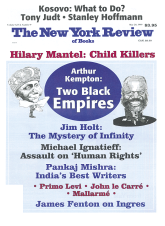In response to:
Talking with Mao: An Exchange from the March 18, 1999 issue
To the Editors:
I regret that I cannot take the authorial credit that Henry Kissinger so graciously extends to me [“Talking with Mao: An Exchange,” NYR, March 18] when he describes “Mr. Burr’s canard that the papers I deposited in the Library of Congress had been placed there to prevent access to them under the Freedom of Information Act.” My remarks on this point in my book, The Kissinger Transcripts, merely follow in a long line of commentators, not the least of whom was Justice John Paul Stevens, who observed in the Kissinger v. Reporters’ Committee for Freedom of the Press case: “Finally, the fact that the documents had been removed by the head of the agency shortly before the expiration of his term of office raised an inference that the removal had been motivated by a desire to avoid FOIA disclosure.”
The fact remains that Dr. Kissinger’s papers at the Library of Congress, which are closed to the public without his permission until five years after his death, contain the only complete set of the highest-level records of the foreign policies of this country in the Nixon and Ford years. My book is testament to the fact that copies of these documents can also be found in various scattered locations in the government, including the Nixon papers, the Ford papers, the State Department’s files, and the papers of Kissinger aides like Winston Lord. In my book, I describe this reality as a “deliberate inconvenience” to scholars. And because of the national security secrecy restrictions on almost all of these documents, Dr. Kissinger had every reason to believe he would have exclusive access to these records for decades after leaving office.
Theodore Draper made a similar point when he reviewed the first volume of Dr. Kissinger’s memoirs in the spring 1980 issue of Dissent. Mr. Draper observed that Dr. Kissinger’s use of classified documents was “nothing less than scandalous” because his book “contains literally scores of direct references to and textual quotations from documents obviously of the highest classification… I wondered how Kissinger could make use of classified documents on such a large scale and of such recent vintage. If they had been declassified for him, could I or any other scholar have access to them? Could one check up on how he used these documentary sources?” Draper found that the answer was no. “In effect, only quotations were declassified, documents were not. By means of this dodge, no one else can gain access to these documents to determine how faithfully Kissinger made use of them.”
Even more problematic is Dr. Kissinger’s claim that the only unique originals in the Library of Congress collection are the transcripts of “telephone conversations ruled by the US Supreme Court as private.” But the Supreme Court only ruled that the Reporters’ Committee did not have standing to sue; it did not rule on whether or not the telcons were private. The only courts that did—in decisions vacated by the Supreme Court—in fact decided that the telcons were the “property of the United States,” which were “wrongfully removed and should be returned to the State Department.” Indeed, the Supreme Court’s decision on Reporters’ Committee suggested that if the telcons were government records, Kissinger’s treatment of them probably violated the Federal Records Act “since he did not seek the approval of the Archivist prior to transferring custody to himself and then to the Library of Congress.” As the Court pointed out, “The Archivist did request return of the telephone notes from Kissinger on the basis of his belief that the documents may have been wrongfully removed under the Act. Despite Kissinger’s refusal to comply with the Archivist’s request, no suit has been instituted against Kissinger to retrieve the records under 44 USC 3106.”
Finally, Dr. Kissinger claims that he has made the telcons and other classified documents available to official State Department historians. But they cannot take notes from, or make copies of, the telcons. Copies of those documents will be made available for use in State Department historical compilations only when Dr. Kissinger gives his permission.
I would encourage Dr. Kissinger to return the telcons voluntarily; failing that, the Archivist of the US should bring suit. Needless to say, my publishers are eager for a sequel.
William Burr
Senior Analyst
The National Security Archive
George Washington University
Washington, D.C.
This Issue
May 20, 1999



